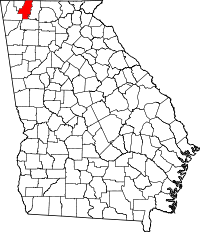Cohutta, Georgia
| Cohutta, Georgia | |
|---|---|
| Town | |
 Location in Whitfield County and the state of Georgia | |
| Coordinates: 34°57′33″N 84°57′10″W / 34.95917°N 84.95278°WCoordinates: 34°57′33″N 84°57′10″W / 34.95917°N 84.95278°W | |
| Country | United States |
| State | Georgia |
| County | Whitfield |
| Area | |
| • Total | 2.5 sq mi (6.5 km2) |
| • Land | 2.5 sq mi (6.4 km2) |
| • Water | 0 sq mi (0.1 km2) |
| Elevation | 863 ft (263 m) |
| Population (2010) | |
| • Total | 661 |
| • Density | 264.4/sq mi (101.7/km2) |
| Time zone | Eastern (EST) (UTC-5) |
| • Summer (DST) | EDT (UTC-4) |
| ZIP code | 30710 |
| Area code(s) | 706/762 |
| FIPS code | 13-17496[1] |
| GNIS feature ID | 0331428[2] |
Cohutta is a town in Whitfield County, Georgia, United States. It is part of the Dalton Metropolitan Statistical Area. The population was 582 at the 2000 census.
Geography
Cohutta is located at 34°57′33″N 84°57′10″W / 34.95917°N 84.95278°W (34.959202, -84.952908).[3]
According to the United States Census Bureau, the town has a total area of 2.5 square miles (6.5 km2), of which 2.5 square miles (6.5 km2) is land and 0.04 square miles (0.10 km2) (1.59%) is water.
Demographics
| Historical population | |||
|---|---|---|---|
| Census | Pop. | %± | |
| 1890 | 268 | — | |
| 1970 | 393 | — | |
| 1980 | 407 | 3.6% | |
| 1990 | 529 | 30.0% | |
| 2000 | 582 | 10.0% | |
| 2010 | 661 | 13.6% | |
| Est. 2015 | 637 | [4] | −3.6% |
As of the census[1] of 2010, there were 661 people, 275 households, and 170 families residing in the town. The population density was 264.4 people per square mile (90.2/km²). The racial makeup of the town was 95.76% White, 2.27% African American, 0.30% Native American, 0.61% Asian, 0.61% from other races, and 0.45% from two or more races. Hispanic or Latino of any race were 1.97% of the population.
In the town the population was spread out with 23.0% under the age of 18, 63.7% between the ages of 18 and 64, and 13.3% who were 65 years of age or older. The median age was 37 years. For every 100 females there were 89.1 males.
In 2000, the median income for a household in the town was $41,563, and the median income for a family was $44,444. Males had a median income of $30,592 versus $22,232 for females. The per capita income for the town was $17,510. About 8.2% of families and 6.9% of the population were below the poverty line, including 8.1% of those under age 18 and 3.4% of those age 65 or over.
Culture
The architecture of the small city gives the impression that it once displayed a vibrant downtown; this is perhaps due to the once-booming railroad system that still rumbles through Cohutta. Cohutta reflects the trajectory of many smaller towns in the United States. The town emerged as a stop on the railroad from Cleveland, Tennessee to Dalton, Georgia, and served as the center for the surrounding farming areas. According to local lore, the town was originally known as "Shakerag," from the rag would-be passengers would wave to stop trains passing through.
In the 1920s, the town had a bank and a hotel, as well a high school, and was frequented especially in summer by inhabitants of Chattanooga seeking cooler temperatures. The high school burned down in 1952, and was not rebuilt.
As recently as the late 1960s, Cohutta had a small supermarket, three smaller "sundry" stores, a feed and seed, and a hair salon. The improvement of roads and the ease of access to larger cities (in this case, Dalton) drew shoppers away, so that by the 1990s, Cohutta had no businesses at all. Over the last decade, the surrounding area has become something of a bedroom community for Dalton, with housing developments taking over many of the farms in the area.
Cohutta also prides itself on the Red Clay State Historic Park that serves as a national Native American meeting ground, Cherokee memorial with a museum, and outdoor park and recreation center for visitors. This part of the state is rich in Cherokee history as well as classic southern heritage.
The city is home to the Cohutta Fish Hatchery, formerly a part of the U.S. Game and Fish Department, and is now operated by the University of Georgia. The hatchery has a small visitors' center, open to the public.
Cohutta is also the original hometown of Marla Maples, ex-wife of President-elect Donald Trump. Marla's family still live in Cohutta. The first Hispanic Police Chief in the State of Georgia (Armando "Andy" Lopez) was hired by the Cohutta Police Dept in 2003. In 2016, Lopez and the City of Cohutta parted ways. Raymond Grossman is the Chief of the Cohutta Police Department.
References
- 1 2 "American FactFinder". United States Census Bureau. Archived from the original on 2013-09-11. Retrieved 2008-01-31.
- ↑ "US Board on Geographic Names". United States Geological Survey. 2007-10-25. Retrieved 2008-01-31.
- ↑ "US Gazetteer files: 2010, 2000, and 1990". United States Census Bureau. 2011-02-12. Retrieved 2011-04-23.
- ↑ "Annual Estimates of the Resident Population for Incorporated Places: April 1, 2010 to July 1, 2015". Retrieved July 2, 2016.
- ↑ "Census of Population and Housing". Census.gov. Archived from the original on May 11, 2015. Retrieved June 4, 2015.
